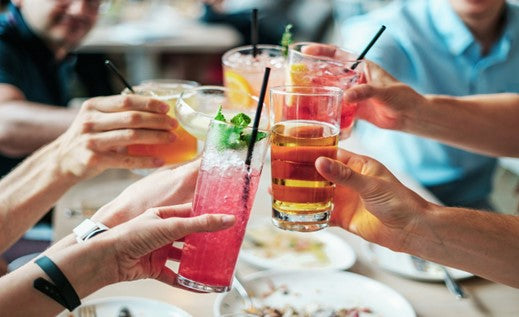Your Cart is Empty

Alcohol is not as healthy as fresh keto-friendly juices. However, cutting out alcohol can be more difficult than cutting out carbohydrates for some people.
Therefore, we have prepared a complete guide to understanding the effects of alcohol on ketosis.
Can you drink alcohol during the state of ketosis? Can alcohol help a person trying to lose weight? And how many calories are we talking about with each shot of alcohol? The guide will explore all topics and help you understand how to torch stubborn fat with a pinch of alcohol!
Most drinks contain sugar and carbs, including beer, some wine, and cocktails. With so many loaded calories, it is easy to conclude that too many drinks can negatively impact your diet.
As you drink more and more alcohol, your body finds just enough sugar to burn instead of relying on ketones produced by burning fat. Consequently, your body leaves ketosis and loses its almost superpower-like ability to burn each ounce of fat you consume.
But as long as we have dry, light, and clear drinks, we can’t (and don’t have to) give up alcohol so easily!
There is an endless menu of choices regarding alcohol that has the minimum effect on your keto diet. These include:
Despite the best options for consuming alcohol, all dry, light, and clear drinks still affect ketosis in some ways.
Alcohol, unlike carbs, protein, or fat, cannot be stored in any way by the body. Hence, to get rid of alcohol, our body has to utilize it for energy to break it down readily.
The body breaks down alcohol into acetate using several specialized enzymes. And the broken alcohol is utilized to make energy. As this process continues, ketosis slows down.
P.S: Just because alcohol affects ketosis does not mean a glass will knock your body out of ketosis and off its diet track. Instead, only the rate of ketosis will slow down.
Every fitness enthusiast has one quality: they do more than listen to expert advice. Instead, they research and understand the science and process behind each tip and fitness trick!
So, let us explain how alcohol interacts with ketosis and the fat-burning process.
Macronutrients are the nutrients required to survive, build, and maintain a healthy body and mind. Micro-nutrients are needed in smaller quantities compared to macronutrients. Together, they make up essential nutrients that each person requires.
Alcohol is different. It is categorized as the fourth macro-nutrient, but it is non-essential, unlike fats, carbs, and protein.
While your liver breaks down alcohol into ketones, it stops burning fat. Hence, ketosis often halts temporarily until all the alcohol has been broken down.

When you are on a non-keto diet, your liver stays busy. There is always glucose to burn. As a result, when you consume alcohol on any regular diet, especially with a high amount of carbs, the rate at which alcohol is oxidized slows down. A slowed-down metabolization of alcohol means reduced blood alcohol levels, tipsy steps, and hangovers.
On the other hand, consuming alcohol on a ketogenic diet can affect your tolerance levels. Since there is no glucose available to burn, your liver burns alcohol much faster, making you tipsy in a few minutes and shots.
The first time you consume alcohol after going on a high-fat keto diet can catch you off-guard. Therefore, even if you know your previous alcohol tolerance, it's better to have a safe-than-sorry approach and a designated sober driver.
Every diet requires focus and willpower. Each step in the wrong direction takes you away from your fitness goals and diminishes your determination.
While one sip or a drink does not affect ketosis significantly, it can be the beginning of your keto journey's end. Therefore, alcohol must be treated as an indulgence and a cheat meal.
And as you consume alcohol, ensure to count its calories, and keep it under a caloric deficit.
We reached out to a ketosis expert to get his insights about the effects of alcohol on a ketogenic diet.
According to him, or should we say science, alcohol is converted to ketones by your liver. Hence, when you consume alcohol, you technically stay in ketosis, albeit the rate slows.
If we can give you a clear verdict if you should go cold turkey and completely give up alcohol, it’s this: you don’t have to.
You can enjoy a few sips occasionally.
Choosing drinks that contain 40% alcohol is the least of all evils. Even though they are challenging to gulp down, they are your safest bet.
But we aren’t looking for safe bets, are we?
Thus, you can try a homemade keto cocktail from the following.
For a spicy keto collagen margarita, you can check out collagen-based keto-friendly products that will help you enjoy alcohol while keeping your body in ketosis.

Keto products are beneficial and a key to unlocking ketosis' potential. For instance, keto activation helps your body get into a state of ketosis faster.
So, it’s natural to wonder if alcohol will reduce the effectiveness of keto products. And the answer is no. Alcohol does not affect any keto-based products you consume to accelerate your keto diet and weight loss.
Nobody knows your body as you do. Hence, if you wish to try alcohol on a ketogenic diet, you must consume it moderately and safely.
And for keto products, you can consume them without worrying about alcohol reducing their efficacy.
In case you are looking for the best keto products, check out Ketao – a leading provider of keto friendly products empowering people to live a truly happy and healthy life.
Ans) You can drink alcohol on keto and still lose weight, but only as long as you stay in a caloric deficit.
Sign up to get the latest deals, exclusive offers, Keto education & more!